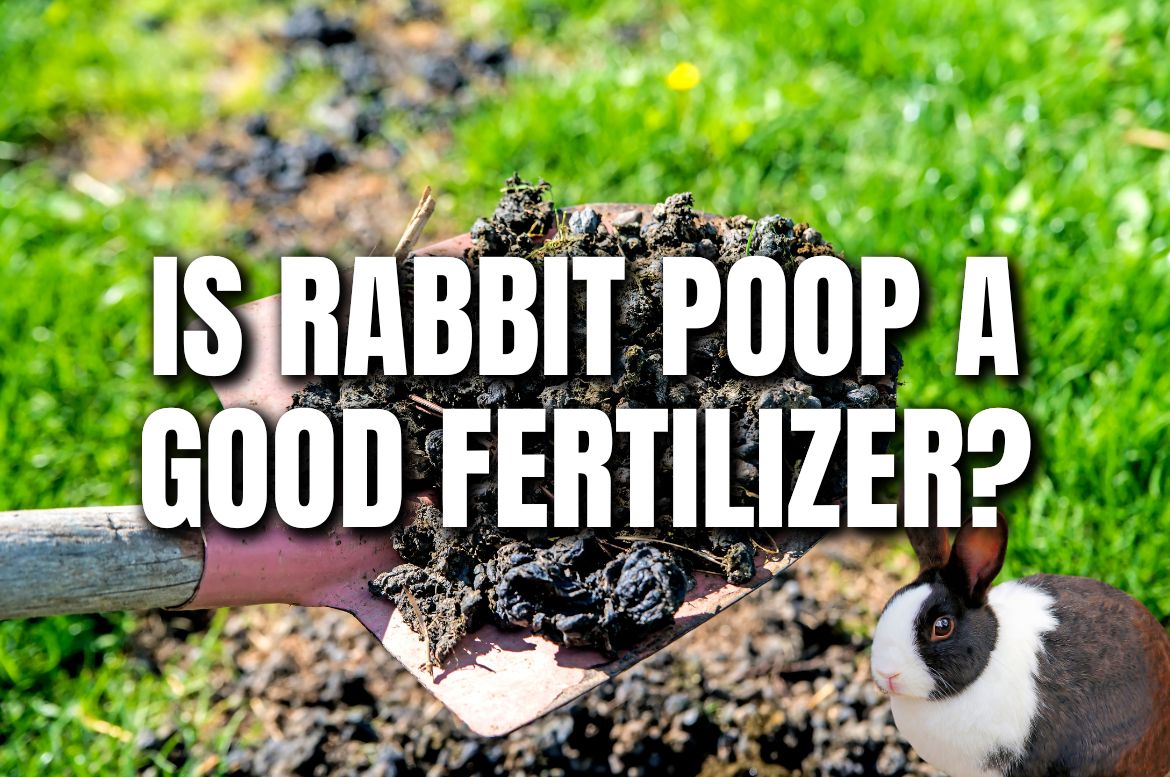
Many gardeners ask about the question, if rabbit poop makes an effective fertilizer. So, it needs to be answered properly. Most probably, the reason behind this question is the poop-eating behavior of rabbits. Pet owners think that it is also of great value to plants, which is somehow correct.
Rabbit poop is a good fertilizer and boosts plant growth. It is a cold manure consisting of nitrogen, phosphorus, and potassium. The poop pellets are safe, odorless, and cost-effective. Moreover, it improves soil texture by enhancing the quality. However, it can disturb soil pH and attract pests. Moreover, a higher content of nitrogen can burn plants on direct application. You can also use rabbit pee and old poop as fertilizer.
Its high nutritional value makes it a suitable fertilizer for different types of gardens. It is safe for fruit-bearing, vegetable, and flowering plants. Moreover, the domestic rabbits consume hay, fresh vegetables, and leafy plants. Do not worry about the infection of plants. Their droppings are free of pathogens as they eat fresh and clean food.
Why is rabbit poop a good fertilizer?
Rabbit droppings boost the growth of plants when you mix them in soil. Also, it offers many advantages to gardeners in terms of cost-effectiveness and ease of use. Do not waste it by dumping it in the bin. Mixing it in the soil can improve the growth of plants.
1. Easy to handle
It is pretty easy to handle rabbit poop because they produce it in the form of pellets, unlike those of cow or horse poop. You can directly use these pellets or make their compost before use.
I mostly used it in the pellet form to avoid the hassle of composting because my garden is small. It takes no time to spread these pellets all around the plants. Another benefit is the dry texture of the poop, making it easy to collect the droppings.
Let it dry in the open air if it gets wet by the rabbit pee. Additionally, it is not ideal to use wet poop because it can attract mold and pose a risk of infection on the plant.
In contrast, composting is a time-taking process, but it is a suitable method to spread the poop in a large garden. You can consider composting for the garden used to produce commercial crops.
2. Safe to use
Domestic rabbits get ideal living conditions and healthy foodstuff. They eat fresh and properly washed food free from pathogens or parasites.
The droppings of the bunnies are less likely to infect plants as they are not supposed to be loaded with microbes and worms. Most of their diet consists of hay and vegetables.
They also occasionally eat fruits and other nutrient-rich foods. Some gardeners do not wear gloves while collecting and spreading their droppings, which means there is no risk of contamination to garden plants.
3. Cold manure
Rabbit poop is considered cold manure, which means you can directly use them as fertilizer. In contrast, the manure of chickens, cows, and horses is hot and cannot be used directly. There is no need to prepare a compost enriched with simpler nutrients.
Collect them from the bunny hutch and mix them in the soil around the plant roots. It will not burn plants when you use the right amount of droppings. Excessive use of fertilizer is not good, whether it is chemical fertilizer or the poop of bunnies. Accordingly, you should know the appropriate amount of poop that is required by the plant to avoid damage. Otherwise, a higher nitrogen content is not good for a plant’s survival.
4. Cost-effective
A rabbit can produce almost 200 to 300 pellets daily with a good diet. It means there is no need to get chemical fertilizer from the store to spray on the plants. You can improve plant growth with these droppings.
This amount seems sufficient for use on plants in a small garden. It is cost-effective and available at less than two to three times the cost of cow and chicken manure.
One of my friends had a large group of pet bunnies at home. So, he started selling their poop to nearby at reasonable rates. It was not only beneficial for him but also for the gardeners. Moreover, the gardeners do not hesitate to buy the poop of domestic rabbits as it ensures safety.
5. No bad smell
Rabbit poop is odorless, unlike the manure of other larger animals. Horse and cow manure are disgusting to handle due to their bad smell; that’s why it is better to use odorless rabbit manure.
The size of bunny droppings is small, and these do not produce any stinky smell. However, it is not recommended to use it when they produce runny poop and give off a bad smell. It indicates that this furry animal is sick and needs medical help.
6. Improves soil texture
It is also beneficial for the soil texture, which improves due to the presence of beneficial microbes. These microorganisms break down the upper hard layers of soil and increase its porosity.
Accordingly, increased porosity helps increase water and moisture retention in the soil. Plants can thrive well in this soil when they get plenty of water from it.
One of my neighborhood friends found it highly effective as his plants were dying due to the low moisture retention capacity of the soil. He began to use the poop of his pet bunny and got rid of this problem within a year.
It has 2% nitrogen, 6% phosphorous, and 1% potassium. Also, it contains carbon, zinc, manganese, and calcium. Due to the higher amounts of these elements, rabbit poop is also called “premium fertilizer” and “bunny gold.”
Nitrogen boosts plant growth and helps them absorb carbon from the soil. The phosphorous content in the poop helps in the growth of roots, stems, and flowers of the plants. The potassium contents in the manure help digest nutrients and produce food for plants.
7. Faster composting
Another potential benefit of using the rabbit poop is faster composting. When you mix it with composting material, its efficiency will increase, and complex ingredients will begin to break faster than usual.
This means you can add it to the compost bins to prepare food for your plants quickly. When you mix it with carbon-rich material, like leaves and straw, it fosters a hot environment that decomposes these materials quickly.
This way, it results in the production of fertile compost, in a short time which boosts plant growth and enhances soil quality.
What are the disadvantages of using rabbit manure in the garden?
Rabbit manure offers many benefits to plants. But, there are a few disadvantages when you do not use it correctly. You should consider all these cons before sprinkling the droppings on your garden.
When you spread it on the pest-infected plant, it can attract more pests. When the plant is infected with worms or microbes, it will cause more harm than good.
The odor of fresh poop is unpleasant. It is difficult to handle the manure, especially when their digestive system is not functioning well.
In addition, there is a risk of mold growth in the wet poop after exposure to pee or rain. Put it deeper into the soil to prevent its exposure to rainwater, or avoid using it in the rainy season because it can attract mold.
Similarly, the use of rabbit poop in higher concentrations can cause damage to plants because nitrogen can burn the plants when its amount exceeds the requirement.
Another challenge for using the rabbit poop as fertilizer is that the commercial gardener will need it in bulk quantity. It requires effort and time to deal with a bulk of rabbit manure.
Furthermore, it can increase or decrease the soil’s balance. Be careful! Do not use it more than the required amount of fertilizer.
Is rabbit pee a good fertilizer?
You can use rabbit pee and poop in the vegetable garden or grass. It has essential nutrients required by plants. A balanced phosphorous, nitrogen, and ammonia (NPK) content is present. Also, trace elements and potassium are present in it.
It helps in both plant growth and yield. Moreover, it is easy to get rabbit urine without spending money on fertilizer. But it should not be applied directly.
Dilute it in water (1:20) before use. It is not good to apply it without dilution, as the high concentration of nitrogen will damage the plants more.
Its pee has an unpleasant smell, so it cannot be used in large quantities in your garden. Another potential challenge is collecting a large amount of pee when you have a large garden.
Furthermore, harmful pathogens could be present in their pee that can damage or infect your plants. It can disturb the soil pH due to the presence of higher content of nutrients. So, you can use it by considering all these things to reap the benefits.
Can you use old rabbit poop as fertilizer?
Some gardeners avoid using old rabbit poop in the garden believing that the nutritional value of pellets decreases over time. However, this is not true of bunny poop.
You can use it on plants directly or by making a compost. It offers the same nutritional value as the fresh one. But it is better to use it after properly composting it.
It is easy to handle because it is dry, and you can easily sprinkle it in the garden. Old poop will be odorless and safe to use. Also, you can dig it deep in your garden soil.
At first, I thought that old and dry rabbit poop would not work as a good fertilizer. I used it in my garden for almost 6 months to see the results. I found my plants growing and flourishing at the same rate. So, I recommend you to use the old poop, but it should not be older than a few weeks.

